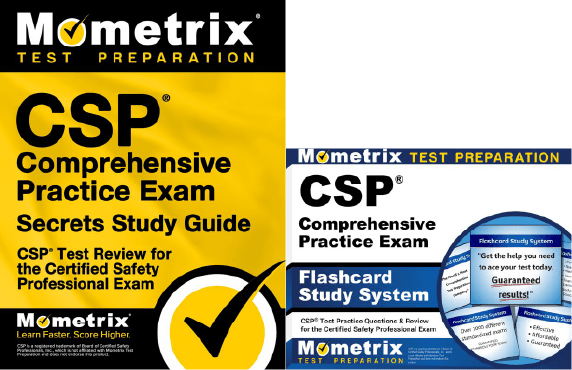If you need help studying for the Certified Safety Professional (CSP®) exam or just want some more information about what the exam is like, you’ve come to the right place.
Click below to take a free CSP practice test!
What’s on the Exam?
How to Register
Exam Scores
Retaking the Exam
What Test-Takers Are Saying
FAQs
CSP Exam Eligibility
Before you can begin the registration process, you’ll need to have at least a bachelor’s degree, and you’ll need to rack up at least four years of professional safety experience.
Once you meet those requirements, you’ll need to ensure you’ve obtained a BCSP qualified credential before you register for the exam.
What’s on the Exam?
First, let’s talk about the questions on the exam. There are 200 multiple-choice questions total, but only 176 of the questions will count toward your score. Why is that?
The 24 unscored questions on the CSP exam are called “beta” questions. These are added to the exam to determine if they’re good enough questions to add to future versions of the test.
The trick is that you won’t have any way of knowing which questions are scored and which ones are beta. They will appear just like the scored questions throughout the test.
The time limit for the exam is 5.5 hours. There aren’t any scheduled breaks, but you’re free to take restroom breaks as needed.
Let’s take a closer look at the different sections of the CSP exam.
1. Advanced Application of Safety Principles
25% of the exam
- Principles of minimizing hazards
- Process safety principles
- Workplace hazard evaluation
- Facility life safety feature evaluation
- Fleet safety principles
- Evaluating materials handling methods and controls
- Evaluating tool, machine, and equipment use
2. Program Management
25% of the exam
- Benchmarks and performance standards
- Determining a plan of action by analyzing performance
- Measuring, analyzing, and improving EHS culture
- Incident investigation techniques and corrective actions
- The Management of Change process
- System safety analysis techniques
- Leading and lagging indicators
- Required components for plans, systems, and policies
- Document retention
- Budgeting, finance, and economic analysis techniques and principles
- Management leadership techniques
- Evaluating and analyzing data
3. RISK MANAGEMENT
15% of the exam
- The safety risk evaluation process
- Identifying and mitigating EHS hazards by applying risk management strategies
- Financial risk mitigation strategies
- The risk analysis process
4. Emergency Management
9% of the exam
- Emergency Response Plans
- Elements in disaster response and recovery
- Key components of fire prevention, protection, and suppression
- Procedures for transporting and securing hazardous materials
- Workplace violence prevention programs
5. Environmental Management
6% of the exam
- Environmental protection and pollution prevention programs
- Managing hazardous materials
- Waste management
- Sustainability principles and practices
- The impact of environmental issues
6. Occupational Health and Applied Science
10% of the exam
- Implementing techniques for measurement, sampling, and analysis
- Principles of public health
- Exposure control plans
- Risk mitigation plans
- Ergonomics and human factors
- Chemistry principles
- Core physics concepts
7. Training
10% of the exam
- Determining worker training, competencies, and qualifications
- Developing training programs with training materials
- Education and training methods and techniques
- Adult learning principles
How to Register
To get started with the registration process, you’ll need to submit an application via the BCSP website. This application includes a $160 application fee.
Once your application is approved, you’ll be given the necessary information to register for the exam.
Exam Scores
The exam is scored using two methods: the modified Angoff method and the bookmark standard setting method.
This method relies on a group of subject matter experts to evaluate each question on the exam and determine its overall difficulty. Once a rating is agreed upon for each question, they establish a cut score, which indicates how many questions you need to answer correctly to be at the minimum level of competency.
Bookmark Standard Setting Method
This method relies on a group of subject matter experts to evaluate each question on the exam one at a time. The goal is to find a single question that represents the minimum level of knowledge/ability required to be a competent CSP (in some cases, they may decide there are multiple “bookmark” questions).
Online CSP Prep Course
If you want to be fully prepared, Mometrix offers an online CSP Prep Course. The course is designed to provide you with any and every resource you might want while studying. The CSP Course includes:
The CSP Prep Course is designed to help any learner get everything they need to prepare for their CSP exam. Click below to check it out!
Retaking the Exam
If you didn’t get a passing score on your first try, that’s okay! You can retake the test as many times as you’d like. Just note that there’s a mandatory six-week waiting period between attempts.
What Test-Takers Are Saying
Don’t just take our word for it! See what real test-takers are saying about the CSP exam:
“Make sure you know risk management, PSM, safety management principles, hierarchy of controls, and training principles by heart because it’s more than half the exam.”

nismov2
“With the math questions, they give you formulas for the simple stuff and do not give you formulas for the more complex stuff. It was good to know certain things they did not give like areas, concentration/exposure calculations, and probability (adding or multiplying).”

one8sevenn
“Lots of questions on training and safety management. Maybe like 4 or 5 math questions. Only had 2 without the formula provided.”

Far_Tomatillo_7637
FAQs
How many questions are on the CSP exam?
The exam contains 200 questions.
How long is the CSP exam?
The exam is timed at 5.5 hours.
What is the passing score for the CSP exam?
You’ll need to answer at least 140 questions correctly to pass the exam.
How much does the CSP exam cost?
The exam fee is $350.
CSP is a registered trademark of Board of Certified Safety Professionals, Inc., which is not affiliated with Mometrix Test Preparation and does not endorse this page.



 CSP Online Course
CSP Online Course CSP Study Guide
CSP Study Guide CSP Flashcards
CSP Flashcards

